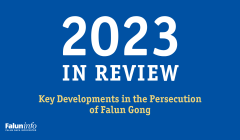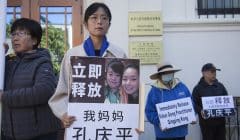What to Watch For in China in 2023: Five Trends in the Persecution of Falun Gong

As people around the world celebrated Chinese New Year and welcomed the Year of the Rabbit on January 22, tens of millions of people in China remain unjustly imprisoned, separated from their family, or pursued by Chinese Communist Party security forces, simply because they practice Falun Gong or have shared information that the Party wishes would remain hidden.
During 2022, the Year of the Tiger, the CCP’s persecution of Falun Gong practitioners intensified alongside nationwide COVID-19 lockdowns and the 20th Party Congress. Looking ahead to 2023, these are five key trends to watch for.
1) Targeting Falun Gong practitioners as part of censorship efforts surrounding spike in COVID infections and deaths
After three years of imposing city-wide lockdowns and other severe restrictions on movement to stem the spread of COVID-19, in December 2022, the CCP abruptly lifted most public health measures related to the virus in response to nationwide protests demanding their end. The rapid change, limited preparation by authorities, and highly infectious variants have led to a surge of COVID-19 cases and deaths in China.
As the CCP has done throughout the pandemic, Chinese officials are restricting information about the true scale of infections and growing number of deaths, obfuscating data, and censoring the internet.
Since 2020, Falun Gong practitioners in many parts of China have taken steps to obtain and share information about the state of affairs in locked down areas or hospitals, at times garnering significant international attention. Several practitioners who have done so have been detained, prosecuted, and sentenced to long prison terms.
With the latest upsurge in cases, practitioners have once again begun to share regular updates, including via the Minghui website. As infections spread amid news blackouts in 2023, watch for citizen journalists who practice Falun Gong being both a source of vital information and also facing reprisals for sharing uncensored information–including photos and video footage–with the outside world.
The targeting of Falun Gong may be more likely in regions of northeastern China—like Hebei Province, Shandong Province, Jilin Province, and Heilongjiang Province— where many Falun Gong practitioners reside and where authorities have historically been especially brutal in their crackdowns against the group.
2) High-tech surveillance used to monitor and detain Falun Gong practitioners
Over the past two decades, the CCP has constructed the world’s most sophisticated system of authoritarian surveillance, combining high-tech monitoring of public places, facial and voice recognition technology, biometric data collection, internet surveillance, and increasingly integrated database systems to track specific individuals.
Falun Gong practitioners have been both a key target of such surveillance and a testing ground for new technologies, as evidenced by a growing body of investigations emerging in recent years. One researcher found that “key individual” databases going back to 2008 were used to monitor Falun Gong and now target a much wider array of victims in China, including foreigners.1
The human rights group Freedom House reported in 2022 that “many Falun Gong practitioners have been jailed in recent years for posting messages about the spiritual group or human rights abuses on social media, accessing banned websites, and possessing or sharing prohibited VPN technology.”
Indeed, since 2020, the Falun Dafa Information Center reported on several cases of practitioners who were detained or sentenced to prison for up to five years over posts made on WeChat or after being caught on camera in a public place speaking to someone about Falun Gong.

A December 2022 investigation by the tech publication IVPM identified software created by the Chinese firm Hikvision that is used for “smart policing” and includes an alarm specifically flagging if a person is a Falun Gong practitioner. As the CCP improves its ability to monitor online and offline activity, watch for new incidents of surveillance technology being used to suppress the rights of Falun Gong believers (including leading to detention and imprisonment), emerging evidence of their systematic targeting by Chinese security forces, and new innovations in monitoring. Further investigation and research are needed to fully document the scope of surveillance targeting Falun Gong practitioners and its consequences.
3) New international sanctions and imprisonments of CCP officials involved in the persecution of Falun Gong
During 2022, several Chinese officials involved in the persecution of Falun Gong faced sanctions from the US government, internal CCP purges, or death as in the case of Jiang Zemin, the architect of the anti-Falun Gong campaign. Looking ahead to 2023, additional officials may face sanctions. Notably, to date, US State Department sanctions tied to abuses against Falun Gong have been imposed against human rights violators in Sichuan, Fujian, and Tibet but not yet in provinces in northeastern China where the persecution has consistently been the most intense and often deadliest.
Several high-ranking Chinese officials involved in the persecution of Falun Gong have in recent years themselves been purged among CCP infighting and corruption charges. Liu Yanping, the former deputy minister of the Ministry of Public Security, was sentenced in January 2022 to death. In September 2022, former Central 610 Office Director Sun Lijun was sentenced to life in prison.
More heads may roll in 2023. Additionally, watch for COVID-19 infections among CCP officials responsible for repression against Falun Gong and the possible impact that their incapacitation has on the severity of the persecution in different locales. As of early January 2023, high-ranking Chinese officials known for their role in persecuting Falun Gong have either tested positive or died due to complications related to COVID-19, including Xie Shufan, former Deputy Chief of the Jinzhou Propaganda Department in Liaoning Province and Liu Ji, former Vice-Minister of China’s National Sports Commission.
4) The fate of Falun Gong in Hong Kong
Hong Kong is home to an active community of Falun Gong practitioners. Unlike their counterparts within Mainland China, these believers have long been able to practice their faith freely and publicly. They have also been able to set up information booths with materials about the practice and the human rights situation in China, although the booths have periodically faced violent assaults from pro-Beijing attackers.

Since adoption of the restrictive National Security Law in 2020, local Falun Gong practitioners and their supporters have been concerned that their rights could be curtailed and that the group could even be banned and violently persecuted, like in Mainland China. Indeed, some pro-Beijing officials have issued public calls to ban Falun Gong and in at least one incident in 2021, authorities fined practitioners for an exhibit.
For the most part, however, even as political activists, journalists, and others critical of the CCP in Hong Kong face detention, prosecution, and other CCP in Hong Kong face detention, prosecution, and other reprisals, Falun Gong practitioners have been able to continue to practice their faith in a limited capacity. Moreover, in 2022, there were at least three cases at lower levels of the judiciary where courts punished attacks on Falun Gong practitioners or information booths, and overall upheld basic rights such as free expression and the display of a Falun Gong banner in public.
As broader protections for civil rights–including free expression and freedom of religion–deteriorate in Hong Kong, the situation of the local Falun Gong community remains precarious and should be monitored closely by the international community in 2023.
5) Transnational persecution of Falun Gong practitioners and their supporters
Since 1999, the CCP’s persecution of Falun Gong has rarely stayed within China’s borders. Refugees and local practitioners around the world have faced surveillance, harassment, and even physical assaults from Chinese diplomats, security services, and various proxy entities, including in Chinatowns and on college campuses. A January 2021 report by Freedom House found that the Chinese regime engages in the most sophisticated, global, and comprehensive campaign of transnational repression worldwide and that among its targets are Falun Gong practitioners. Leaked CCP official speeches within the past decade refer to the need to treat countries with active Falun Gong communities, like the United States, “as the main battlefield.”
Over the past two years, this campaign has continued with new incidents and tactics emerging. Moreover, amid the various personnel changes at the 20th Party Congress, CCP official Chen Wenqing was newly handed authority over the security apparatus and the party’s powerful Political and Legal Affairs Committee. Chen’s previous position was at the Ministry of State Security, an agency focused on foreign affairs, including transnational repression campaigns. With Chen now leading the security apparatus, an even greater investment in transnational suppression of CCP “enemies” may emerge, including against Falun Gong targets.
Alongside potential new physical assaults, watch for various forms of CCP influence that serve the purpose of meddling in diaspora activities or hindering US official support for human rights in China and other causes disfavored by the CCP. These may include forceful diplomatic pressure, such as embassy or consular letters or visits to local officials in an attempt to stop public support for Falun Gong victims or attendance at related events.

Watch also for covert tactics to slander Falun Gong outside China as espoused in leaked CCP documents, including damaging attempts to plant demonizing articles in local media or to encourage foreign opinion leaders and media to echo the CCP’s anti-Falun Gong narratives. This emerging tactic to masquerade CCP opinions in the West, recorded in numerous accounts across the past decade, is tremendously detrimental, serving to use Western institutions, media networks, and policy influencers to spread anti-Falun Gong sentiments outside of China’s borders.
In parallel, as democratic governments become more attuned to these threats and the activities involved in transnational repression and persecution, watch for additional community protection measures for Falun Gong practitioners, sanctions against CCP officials involved in acts of transnational repression, and even prosecutions of CCP agents active in democratic countries like the United States.
Access the full PDF brief with the Center’s recommendations here.
Contact the Center researchers to schedule a private briefing at [email protected].








